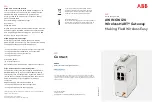
Creating routes
Dialogic® Vision™ CX Video Gateway Administration Manual
Routing table expressions
This topic describes the routing table expressions you can use in the gateway routing
table.
Pattern matching expressions
The following table provides a description of the regular expressions used for pattern
matching in the To incoming and From incoming fields of the gateway routing table.
Pattern
Usage
tel:
Must prefix the regular expression. Indicates that the regular expression applies to
inbound PSTN calls.
sip:
Must prefix the regular expression. Indicates that the regular expression applies to
inbound SIP calls.
. (period)
Must prefix the expression. Indicates that the call will be routed to the PSTN.
\d
Matches any single digit, 0 through 9.
{
n
}
Matches the preceding character exactly
n
times.
For example, the pattern \d{7} matches the seven-digit telephone number in
[email protected] and the first seven-digits in the called number
0123456789. It does not match anything in [email protected].
* (asterisk)
Matches the preceding character zero or more times.
For example, the pattern \d* matches all of the digits in
[email protected] and also matches [email protected],
although the matching substring in this case is empty.
+ (plus)
Matches the preceding character one or more times.
For example, the pattern \d+ matches all of the digits in
[email protected] but does not match
[email protected].
?
Matches the preceding character 0 or 1 times.
For example, the pattern 1?\d+ matches tel:5082711847 and tel:15082711847.
^ (carat)
Causes the pattern that follows the ^ (carat) sign to match only if the match occurs
at the beginning of the string.
For example, the pattern ^847 matches the beginning of number 8479258900 but
does not match the beginning of number 5082711847.
$ (dollar)
Causes the pattern preceding the $ (dollar) sign to match only if the match occurs
at the end of the string.
For example, the pattern 847$ matches the end of number 5082711847 but does
not match the end of number 8479258900.
68
Dialogic
















































